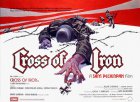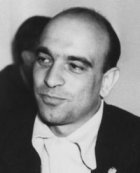
Cross of Iron Page #8
- R
- Year:
- 1977
- 119 min
- 1,003 Views
of the lucky ones, you sure don't
seem anxious to go.
Steiner doesn't even look at Muller who evidently sees someone
at the west trucks.
MULLER:
Hey, you there -- let me see your
Orders --
He runs off, almost colliding with Inge. She looks complacent.
INGE:
Goodbye, Sergeant Steiner.
STEINER:
I'm touched. Up this early just
to say goodbye to me. Or are you
waiting to welcome the new batch
coming in?
INGE:
No. I just thought somebody
should say goodbye to you.
(smiles as Steiner looks
at her)
Gertrud is not coming, Sergeant.
He stares at her. She takes ah envelope out of her pocket.
INGE:
This is for you.
As he snatches it out of her hand.....
INGE:
That's all right. I've already
read it.
STEINER:
You're a pig.
(looks at the envelope, but
doesn't open it)
INGE:
I'll be happy to read it to you.
She takes the envelope from him. He just stands there,
neither objecting nor assenting. Inge's tone, as she
reads, is not as triumphantly smug as might have been
expected.
INGE:
(reads)
"Dearest Rolf -- I can't face you
this morning. How can you and
I know what we feel for each
other? We hate so quickly and
easily, maybe we fall in love
too quickly and easily, too.
There are things I even needed
to tell you about.....
Steiner snatches the letter from Inge. crumples it in
his hand. His face is his usual steel mask again.
He stands still for a moment, then the SOUND of the trucks
MOTORS causes him to look up. The trucks bound for the
front have started slowly off. Steiner looks at the
crumpled letter in his hand, throws it away, runs for the
trucks.
92. MED. SHOT - MULLER
as Steiner runs past him. He stares in amazement as
Steiner jumps onto the back of the last truck heading east.
MULLER:
(almost screaming)
No! No! Steiner -- wrong truck!
You're going home. That one's
going to the front! Steiner --
Steiner -- !
But in the b.g. the truck has disappeared around the corner.
FADE OUT:
FADE IN :
93. LONG SHOT - ROAD SKIRTING A ROW OF BUNKERS - DAY
A truck is seen coming to a stop. A lone figure jumps off the
back, waves to the driver. The truck drives on.
94. MED. SHOT - STEINER
standing in the road, looking about him with some curiosity.
Then, CAMERA TRUCKING with him, he starts to walk. He
passes several SOLDIERS. We can tell by the cursory glances
they exchange that they are strangers to each other.
Steiner enters the bunker.
95. LIEUTENANT TRIEBIG
rounding a corner near the bunker. He HEARS SHOUTS from the
bunker and stops. Then he HEARS a half dozen voices CRYING
in unison, "Steiner! Steiner! Steiner!" Triebig's face
sets. He stands a moment, immobile, then turns, hurries
away in the opposite direction.
96. INT. BUNKER
Kruger, Kern, Schnurrbart and Anselm are grouped around
Steiner. A NEWCOMER stands off to the side a bit. Steiner
is opening a beer bottle.
KRUGER:
You're an idiot, Rolf. Why didn't
you go home when you could have?
STEINER:
(stony-faced)
Heard it was safer here.
KERN:
(nodding)
I was home for two weeks.
THE NEWCOMER:
(angrily)
I wish this kind of talk would stop.
It's -- it's gross exaggeration -- and
what's more, it has a terrible effect
on the morale of the troops at the
front!
Everyone turns to look at the newcomer. Steiner regards him
coolly.
STEINER:
What's your name?
ZOLL:
(defiantly)
Zoll.
STEINER:
Thank you, Herr Zoll for worrying
about my morale.
The men laugh.
SCHNURRBART:
Zoll is a Party member. He's con-
vinced we're winning the war, and
anybody who doesn't think so, he's
quite willing to turn in to the
Storm Troops.
STEINER:
(to Zoll)
My name is Rolf Steiner -- and please
memorize my correct serial number.
I wouldn't want them to come for
the wrong man.
The PHONE RINGS. Zoll answers it.
ZOLL:
(very snappy)
Second Platoon. Zoll speaking.
STEINER:
God, isn't it wonderful hearing a
real soldier speaking again.
ZOLL:
(through the men's
laughter)
Yes, sir -- yes, sir --
(hangs up, turns
to Steiner
Captain Stransky wants to see you
in his bunker.
STEINER:
When?
ZOLL:
Right away.
STEINER:
Good. I missed my Captain Stransky.
97. CLOSE SHOT - STRANSKY'S FACE
The CAMERA PULLS BACK and we SEE that we are in what is
evidently Stransky's bunker. Triebig is facing Stransky.
It is now dark.
STRANSKY:
I'll soften him up, don't worry.
How long have we kept him waiting?
TRIEBIG:
About half an hour.
STRANSKY:
All right. Send him in.
Triebig, still looking worried, goes OUT. Stransky stands
for a moment, moves another chair to the table, then sits
opposite it. The door opens and Steiner comes IN. He looks
at Stransky, his face devoid of expression.
98. MED. SHOT - STRANSKY - AT TABLE
with Steiner in b.g. Stransky's demeanor is carefully
matter-of-fact.
STRANSKY:
Welcome back, Sergeant. Please sit
down.
(impatiently, as
Steiner remains
standing)
You may sit down.
STEINER:
If you order me to.
STRANSKY:
Consider it an order.
Reluctantly, Steiner sits down facing Stransky, who moves the
kerosene lamp so that he himself is sitting in darkness.
STRANSKY:
Are you quite recovered from your
wound?
STEINER:
Quite.
STRANSKY:
Good. Now that you're back, I'm
willing to make a fresh start.
I excuse your past behavior. There
are several important matters I
wish to discuss with you.
STEINER:
(his face shows that
he knows what Stransky
has in mind l there is
a pause before he
speaks)
Certain things can be talked about
only man to man, not superior to
subordinate.
STRANSKY:
(an attempt at a smile)
You would naturally think that.
But, you know, don't you, that
in civilian life, too, a distinction
is made between people and personalities?
For a fleeting moment Steiner's expression darkens, but he
quickly composes his features. His tone is ingenuous.
STEINER:
I don't. But I'm'sure you can
explain that distinction to me.
STRANSKY:
(smoothly)
I can. The difference is a matter
of ethical and intellectual super-
iority and is caused, whether you
like it or not, by class difference.
Those who are reared in dirt will
never or rarely emerge from it
because they have never learned
to see dirt as dirt. Isn't that
self - evident?
STEINER:
(swiftly and quietly)
I disagree. Talent, sensitivity
and character are not privileges
of the upper class.
STRANSKY:
(voice less urbane)
I see. May I ask which of the
two categories you count yourself?
It is an open challenge. Steiner sits up in his seat.
STEINER:
Is this conversation taking place
between two equal human beings, or
between a superior and his sub-
ordinate?
STRANSKY:
(haughtily)
I see no reason to throw the weight
of my rank into the balance.
STEINER:
(quietly)
In that case, I am free not to
answer your tactless question.
There is e silence as fury mounts in Stransky's eyes, but
he controls his voice.
STRANSKY:
You are forgetting yourself, Steiner.
STEINER:
(coldly)
If you feel insecure about standing
on your grounds of equality, we
can easily go back to our regular
Translation
Translate and read this script in other languages:
Select another language:
- - Select -
- 简体中文 (Chinese - Simplified)
- 繁體中文 (Chinese - Traditional)
- Español (Spanish)
- Esperanto (Esperanto)
- 日本語 (Japanese)
- Português (Portuguese)
- Deutsch (German)
- العربية (Arabic)
- Français (French)
- Русский (Russian)
- ಕನ್ನಡ (Kannada)
- 한국어 (Korean)
- עברית (Hebrew)
- Gaeilge (Irish)
- Українська (Ukrainian)
- اردو (Urdu)
- Magyar (Hungarian)
- मानक हिन्दी (Hindi)
- Indonesia (Indonesian)
- Italiano (Italian)
- தமிழ் (Tamil)
- Türkçe (Turkish)
- తెలుగు (Telugu)
- ภาษาไทย (Thai)
- Tiếng Việt (Vietnamese)
- Čeština (Czech)
- Polski (Polish)
- Bahasa Indonesia (Indonesian)
- Românește (Romanian)
- Nederlands (Dutch)
- Ελληνικά (Greek)
- Latinum (Latin)
- Svenska (Swedish)
- Dansk (Danish)
- Suomi (Finnish)
- فارسی (Persian)
- ייִדיש (Yiddish)
- հայերեն (Armenian)
- Norsk (Norwegian)
- English (English)
Citation
Use the citation below to add this screenplay to your bibliography:
Style:MLAChicagoAPA
"Cross of Iron" Scripts.com. STANDS4 LLC, 2024. Web. 22 Dec. 2024. <https://www.scripts.com/script/cross_of_iron_839>.



Discuss this script with the community:
Report Comment
We're doing our best to make sure our content is useful, accurate and safe.
If by any chance you spot an inappropriate comment while navigating through our website please use this form to let us know, and we'll take care of it shortly.
Attachment
You need to be logged in to favorite.
Log In